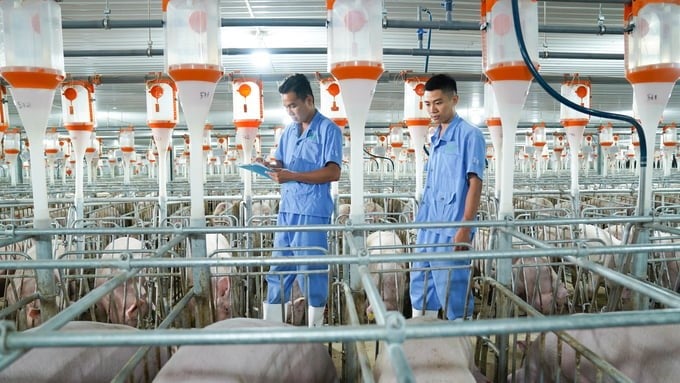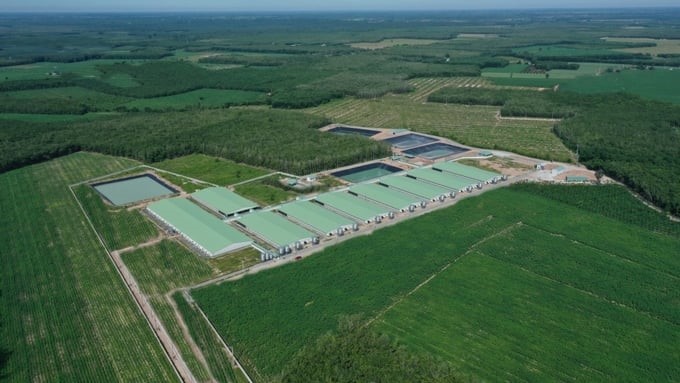May 30, 2025 | 07:43 GMT +7
May 30, 2025 | 07:43 GMT +7
Hotline: 0913.378.918
May 30, 2025 | 07:43 GMT +7
Hotline: 0913.378.918

Before entering BaF's farm, people, vehicles, and belongings must go through quarantine and many antiseptic layers.
Sharing at the 2024 Annual General Meeting of Shareholders recently held, the Board of Directors of BaF Vietnam Agriculture Joint Stock Company (Ticker symbol: BAF) said that the company will double the total herd compared to the same period in 2023.
In 2023, BaF put into operation four new farms in Tay Ninh, increasing the total herd by the end of the year to 37,000 sows and 330,000 market hogs.
In the development roadmap to serve the 2024 goal, BaF said it is expected that seven new farms will be put into operation, along with the plan to start construction of six more new farms, mostly concentrated in Tay Ninh province and some others in Binh Phuoc, Gia Lai, Phu Yen, and Nghe An.
Earlier this year, nine of the company's farms were recognized to meet the GlobalGAP Integrated Farm Assurance version 5.2. standards for pig farming. These standards will be continuously maintained and synchronously applied throughout BaF's livestock production system.
Ensuring biosafety is always BaF's prerequisite when developing livestock farms, especially in the context that the development of African swine fever is still complicated and the damage mostly comes from small-scale livestock farming models.
From the story of choosing a farm location to barn construction standards and isolation measures, all always ensure the legal regulations and operating standards of the International Finance Corporation (IFC).
GlobalGAP is a global organization that aims to promote sustainable agriculture worldwide. Among them, the GlobalGAP Integrated Farm Assurance Version 5.2 Standards have very strict criteria that must be adhered to.
To achieve certification, businesses must meet a minimum of 95% of the secondary requirement principles and comply with 100% of the main requirement principles.
Some important compliance criteria that need to be met include maintaining identification and traceability of product origin from seed to animal feed; ensuring biosafety and factors affecting food safety (such as minimizing the use of antibiotics and avoiding prohibited substances); minimizing adverse impacts on the environment; and meeting social welfare requirements for workers.
Particularly, animal welfare criteria aim to ensure that pigs are cared for in the most comfortable environment (such as barn conditions, farming environment, humane behavior with livestock, etc.) to create the most optimal meat quality.

BaF is also actively implementing livestock production linkages in addition to its self-built farm system.
To ensure the supply of clean pork to the market and implement the goal of increasing the herd in accordance with BaF's criteria, the company has linked with livestock farms and farmers in parallel with self-building 100% new farms.
Linkage activities are carried out on the basis of providing pig seeds and nutritional bran; consulting on the process of biological farming and developing and improving barn standards to improve livestock production efficiency; consuming output; and ensuring the source of clean pork with traceability when it reaches the consumer.
BaF also determined the long-term goal that the total size of the internal pig herd will be 6 million heads and the linked herd will reach 4 million heads by 2030.
In addition to the criteria of complying with biosafety procedures and ensuring a good growth and development environment for livestock, BaF is also applying sustainable development standards to contribute to reducing greenhouse gas emissions.
This activity is implemented by the company throughout the chain, from feeding pigs with vegetarian food to optimize the digestive process to treating and managing waste on the farm to reuse water sources and create a source of organic fertilizer for crop production, and installing solar power systems to take advantage of clean energy sources.
To achieve greenhouse gas emission reduction goals and integrate farming according to international standards, BaF has implemented a manure scraping system to alleviate the pressure on wastewater treatment. The collected pig manure is reused as organic microbial fertilizer, benefiting rice fields. This helps reduce methane emissions in pig farming, enhance soil quality, increase crop productivity, and create a source of clean agricultural products. Consequently, this moves towards a circular economy model with no waste.
Translated by Thu Huyen

(VAN) FAO’s Director-General addresses the 5th Baghdad International Water Conference.
/2025/05/26/1716-4-nongnghiep-191706.jpg)
(VAN) Chain linkages, technological innovation, and raw material zoning are three strategic pillars for the coconut industry to strongly develop and elevate its position on the global agricultural map.
![Advanced mariculture – an inevitable trend: [4] Accompanied by scientists](https://t.ex-cdn.com/nongnghiepmoitruong.vn/608w/files/sohk/2025/05/13/1941-pgsts-vo-van-nha-140958_717.jpg)
(VAN) According to Assoc. Prof. Dr. Vo Van Nha, Director of the RIA III, the development of advanced offshore mariculture is no longer an option but an essential path for Vietnam’s fisheries sector.

(VAN) Vietnam is intensifying the development of mollusk farming areas that meet international standards, aiming for sustainable growth and enhancing its export position in the global seafood market.
![Advanced mariculture – an inevitable trend: [3] Policy-driven momentum](https://t.ex-cdn.com/nongnghiepmoitruong.vn/608w/files/doanhtq/2025/05/21/0104-0616-0348-nuoi-bien-170339_789.jpg)
(VAN) To ensure the success of offshore mariculture that uses advanced technologies, it is essential to establish supportive policies that inspire both individuals and enterprises to invest with confidence.
![Advanced mariculture – an inevitable trend: [2] Outstanding results](https://t.ex-cdn.com/nongnghiepmoitruong.vn/608w/files/sohk/2025/05/12/4632-4136-nuoi-bien-11-164117_819.jpg)
(VAN) Pilot models of high-tech offshore mariculture in Vietnam, particularly in the South Central Coast region, have demonstrated exceptional economic returns and sustainability, setting a new direction for the country’s aquaculture industry.
![Advanced mariculture – an inevitable trend: [1] Moving offshore](https://t.ex-cdn.com/nongnghiepmoitruong.vn/608w/files/phucpm/2025/05/18/0252-2436-nuoi-bien-6-162148_783.jpg)
(VAN) Mariculture using advanced technology and moving offshore is an inevitable trend, as nearshore areas increasingly reveal limitations.